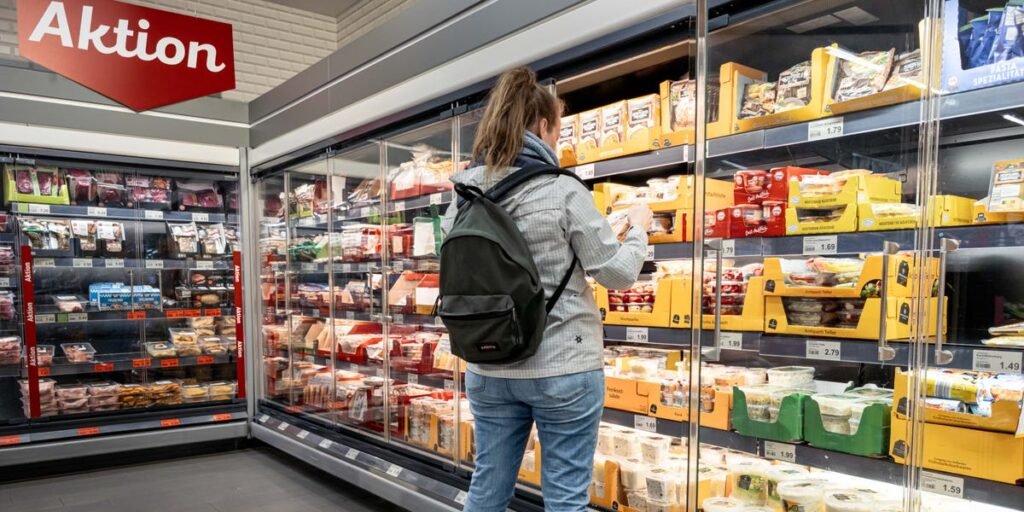What began as a backlash in Canada has spread across the Atlantic as US companies face growing consumer resistance following President Donald Trump’s sweeping tariffs and provocative rhetoric.
While his 20% tariffs on imports from the European Union have been reduced to 10%, the damage to consumer sentiment may already have been done.
European consumers appear increasingly inclined to turn away from US brands, and the data suggests it may not be just a passing trend.
Apps that offer alternatives to US products have gained traction across the continent.
Just over a month ago, Dutch entrepreneurs Xander Kanon and Gerben Houtsma launched Brandsnap, which lets users scan products to check for European origin.
It had been in the works before April, but they told Business Insider that Trump’s move “accelerated” the app’s release and boosted demand.
Chip Somodevilla/Getty Images
“The spikes in growth are closely tied to political actions taken by Trump, particularly around tariffs,” Houtsma said. He cited a surge in downloads from Denmark after Trump again floated a takeover of Greenland in an NBC interview earlier this month.
Backed by the Go European movement, a grassroots volunteer network promoting European-made alternatives, Brandsnap has logged more than 14,000 downloads and 60,000 scans as of early May.
“We’re not trying to start a trade war,” Kanon told BI. “We just want people to know where their money is going.”
Similarly, in France, computer engineer Sacha Montel launched “Detrumpify Yourself” — a free, open-source app designed to help consumers identify hidden US ownership behind everyday products.
“Everyone knows Coca-Cola or Heinz are American, but many don’t realize Lu, Milka, or Le Petit Marseillais are too,” he told BI, naming three widely consumed brands in France.
Montel said the app is a symbolic protest against what he described as Trump’s “aggressive economic and geopolitical policies.”
Companies respond
European companies are also getting involved. Danish retail giant Salling Group introduced a black star label on electronic price tags to indicate products of European origin.
CEO Anders Hagh said in a March LinkedIn post that the move came after a “number of inquiries” from customers seeking to buy more European products. He stopped short of linking it to Trump’s policies.
Some responses have been more dramatic. Haltbakk Bunkers, Norway’s largest oil bunkering operation company, said in a since-deleted Facebook post in March that it would no longer refuel US Navy ships after Trump and Vice President JD Vance criticized President Zelenskyy for failing to acknowledge the extent of American support in Ukraine’s war effort.
Although Norway’s defense minister walked back the decision, the episode underscored rising discomfort with US leadership.
Some US brands are already seeing the fallout.
Tesla, led by Elon Musk, who has voiced support for far-right parties in Europe, recorded a 42% drop in European sales in January and February, as some European showrooms suffered arson attacks.
Rome firefighters
McDonald’s posted a 1% decline in global sales in the first quarter compared to the previous year, with CEO Chris Kempczinski citing an “uptick in general in anti-American sentiment,” especially in Northern Europe and Canada.
In Denmark, brewer Carlsberg said sales of Coca-Cola, which it bottles in the country, declined in the first quarter amid what CEO Jacob Aarup-Andersen described as a “level of consumer boycott around US brands.”
Travel has also been affected, with bookings by Europeans visiting the US this summer down by 25%, hotel giant Accor’s CEO Sébastien Bazin said last month.
Support for boycotts and retaliation
Polls suggest that this shift is not isolated.
A March survey by the French Institute of Public Opinion found that 62% of 1,000 French respondents supported calls to boycott US brands.
Coca-Cola, McDonald’s, Five Guys, Pizza Hut, and Starbucks ranked among the top 20 US brands most likely to be affected.
A study in March of 1,000 Swedes conducted by Lund University in Sweden found almost 20% of respondents said they had boycotted a US brand.
Meanwhile, a YouGov EuroTrack survey released in April found that 75% of Germans believe US tariffs will significantly impact their economy, the highest figure among seven European countries surveyed.
A structural shift?
Some experts think the backlash could signal a lasting change.
In its March Consumer Expectations survey, the European Central Bank reported that 44% of about 19,000 respondents preferred to switch away from US brands, regardless of tariff levels.
The bank warned that this suggested a “possible long-term structural shift in consumer preferences away from US products and brands.”
Lucia Reisch, director of the El-Erian Institute of Behavioral Economics and Policy at Cambridge Judge Business School, echoed that sentiment.
She told BI the trend reflects skepticism of “cold American capitalism,” which she said increasingly clashes with European values of sustainability, inclusion, and human rights.
While some US companies may retain market dominance, she warned that long-term backlash could reshape transatlantic trade around contested standards and value-based preferences.
Not all economic analysts are convinced, however. Hosuk Lee-Makiyama, director of the European Centre for International Political Economy, told BI that boycotts in Europe rarely gain enough traction to significantly dent sales.
“European consumers are much less principled than they claim to be,” he said, adding that online protests did not tend to carry over into real-world shopping habits.
He described Tesla’s European sales decline as more a product of market dynamics than a political backlash — a reminder that European outrage may be loud but not long-lasting.

